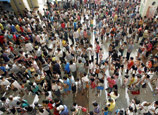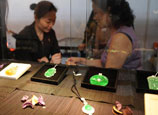
 |
| Li jiangjiang, 9, holds an old teddy bear in her arms. The teddy bear was a wedding gift to Li’s parents 12 years ago. It has been the beloved toy of Li’s elder sister before given to her. (Photo/ CFP) |
NINE-YEAR-OLD Zhang Zhihao and his five-year-old brother Zhang Zhiqiang were engrossed playing Fruit Ninja - a popular cellphone game - yesterday at a roast duck diner on downtown Dagu Road. Meanwhile, their parents attended to business at a market 12 kilometers away.
The boys, from central China's Henan Province, arrived in Shanghai on Tuesday to spend the summer with their migrant worker parents but were entrusted to the diner owner, a family friend, as their mother and father have to work.
During the summer vacation, many "left-behind children" in rural areas come to Shanghai to see their parents.
It should be a time for them to build family bonds and see what a big, modern city looks like. However, many migrant parents have little spare time to spend with their children.
"When you're apart from the children, you miss them every day. When they're here, it's another problem," said Xu Weiming, the diner owner. "The emotions are ambivalent."
Xu said the only thing that can keep the boys inside is mobile phone games. He gave his own phone to them so that they wouldn't play on the streets.
"I have to be responsible for the boys. Shanghai is not like rural areas where children can run around barefoot. Here, the roads are dangerous for children," Xu said.
The migrant population in China has increased from six million in 1980 to 260 million due to urbanization and economic development.
This huge migration of labor has resulted in large numbers of left-behind children, cared for by other family members. Currently, there are about 60 million left-behind children.
"It is unreasonable to have such a large number of left-behind children," said Ren Yuan, a professor at Fudan University's School of Social Development and Public Policy.
Ren said current urbanization is at the price of splintering families, which is not good for children's growth.
"The long-term separation will also cause problems in marriage and family relationships," Ren added.
At the Dagu Road Agricultural Market, almost every vendor faces these problems.
Shen Hongju, a fruit vendor from Hefei City of Anhui Province, brought her nine-year-old daughter to Shanghai last week. But most of the time, the girl stays at home, watching TV or playing on the computer.
"My husband and I have to run the stall every day. Summer is the best season for selling fruit and we can't miss this opportunity to make good money," Shen told Shanghai Daily.
Shen's daughter visits Shanghai almost every vacation and looks forward to coming.
"Children like Shanghai because they have access to the Internet, watch the latest cartoons, play new games and eat good food," Shen said.
Many migrant families worry about how the separation affects children's growth.
"When a child grows up, he might think his parents don't care about him," Xu said.
Shanghai is opening its medical and education resources to migrant children joining their parents here and Ren sees this as the way forward.
"Problems are not unavoidable if the city can be more open. Safeguarding families is more important than economic development," Ren said.
















 Wild Siberian tiger kills cattle in NE China
Wild Siberian tiger kills cattle in NE China


![]()
